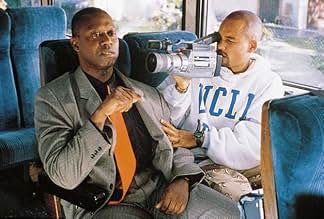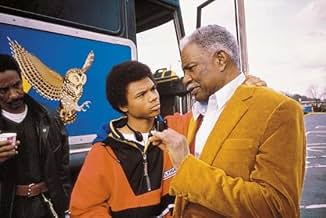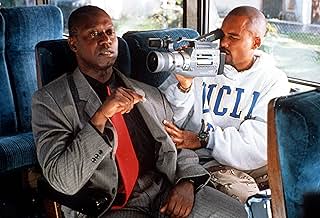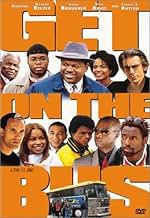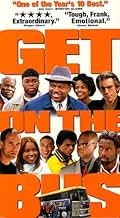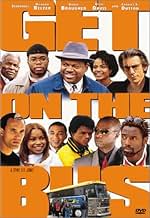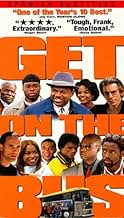IMDb RATING
6.9/10
6.3K
YOUR RATING
A disparate group of African-American men travel by bus to Washington, DC for the Million Man March.A disparate group of African-American men travel by bus to Washington, DC for the Million Man March.A disparate group of African-American men travel by bus to Washington, DC for the Million Man March.
- Awards
- 2 wins & 5 nominations total
Kristen Wilson
- Shelly
- (as Kristin Wilson)
- Director
- Writer
- All cast & crew
- Production, box office & more at IMDbPro
Featured reviews
Get on the bus is a superb film in every way. The acting , the story ,the photography and the sound track are a joy to behold. Spike Lee should be praised for his unbiased view on the struggle for black rights in America. You may not always agree with some of the sentements of the film but you cant help be captivated. Dont miss it! 8 out of 10
Get on the Bus is one of those rare cases for Spike Lee where the screenplay for the film, and most of the performances, supersedes the vision leading it. Lee shot the film quickly, on a combination of 16mm (the kind that makes it look kinda HBO series of the period, not a bad thing) and camcorder video, and he works through what is kind of like a play on a bus: small space, not much room to go like the usual flamboyant touches of style Lee is great at. Instead it's some grainy yellow-brown tinting- the kind that was also done in the likes of Tony Scott's Domino- and an opening sequence meant to emphasize the chains of the teen 'Smooth' put to a less than agreeable Michael Jackson song. For the most part, his function here is to get the cast together and only get so much in the way as to not have them stumble.
So it's sad to say that despite Spike Lee, despite his flawed choices in style (or, at best, a relatively typical low-budget hand-held feel in the bus), despite the mostly wretched R&B songs used that don't fit in with scenes and play over moments that are without reason, Get on the Bus is a good movie. Again, this is a credit to the screenwriter, Blythewood, who takes a big event in modern African-American history and uses it to make a portrait of several types (i.e. a cop, actor, thug-turned-Muslim, old man, gay couple, torn father and son Smooth, among a couple others). What's most commendable is how the material goes past the possible pitfalls of didacticism and heavy-handedness, with the exception possibly of the final couple of speeches. The dialog is honest and tough and even very funny; a scene where they pick up a black republican is as good as anything in a classic Lee film.
And, as well, the actors are a big help. Which may be to say that Lee did do a good job on that front, one that is crucial for a screenplay so dependent on it being so tight knit and, dare I say it, intimate. Charles S. Dutton, Ossie Davis, Andre Braugher, Isaiah Washington, Hill Harper, Richard Belzer in a bit part, they're all spot-on choices, and they help elevate material that needs some 'umph' here and there, something to help out through one or two scenes that feel slightly stuck in the 90s (the kid doing the documentary-for-his-class thing wears off its welcome quick, and this was one of the only visual gimmicks that wasn't too bad). It's a very interesting movie hampered only by a director with nowhere to take the material past where it simply is, and its at its best when we get sucked into a conversation, or a moment, that is either riveting as theater or strikes a chord at the black experience.
So it's sad to say that despite Spike Lee, despite his flawed choices in style (or, at best, a relatively typical low-budget hand-held feel in the bus), despite the mostly wretched R&B songs used that don't fit in with scenes and play over moments that are without reason, Get on the Bus is a good movie. Again, this is a credit to the screenwriter, Blythewood, who takes a big event in modern African-American history and uses it to make a portrait of several types (i.e. a cop, actor, thug-turned-Muslim, old man, gay couple, torn father and son Smooth, among a couple others). What's most commendable is how the material goes past the possible pitfalls of didacticism and heavy-handedness, with the exception possibly of the final couple of speeches. The dialog is honest and tough and even very funny; a scene where they pick up a black republican is as good as anything in a classic Lee film.
And, as well, the actors are a big help. Which may be to say that Lee did do a good job on that front, one that is crucial for a screenplay so dependent on it being so tight knit and, dare I say it, intimate. Charles S. Dutton, Ossie Davis, Andre Braugher, Isaiah Washington, Hill Harper, Richard Belzer in a bit part, they're all spot-on choices, and they help elevate material that needs some 'umph' here and there, something to help out through one or two scenes that feel slightly stuck in the 90s (the kid doing the documentary-for-his-class thing wears off its welcome quick, and this was one of the only visual gimmicks that wasn't too bad). It's a very interesting movie hampered only by a director with nowhere to take the material past where it simply is, and its at its best when we get sucked into a conversation, or a moment, that is either riveting as theater or strikes a chord at the black experience.
Let me begin by letting you know I am neither black or white. I say this so you don't think I speak from a particular bias. I firmly believe that Spike Lee captured the central epic struggle within the black community and its overall effect on the American landscape as a whole. I was happy to see that ALL aspects of the society were equally represented in this film without reinforcing dated stereotypes. This is clearly Lee's greatest work.
EVERYONE SHOULD SEE THIS MOVIE ONCE.
EVERYONE SHOULD SEE THIS MOVIE ONCE.
Get On The Bus is probably one greatest movies people do NOT know about. This movie places men of all ages and different backgrounds together headed to The Million Man March. Although many may not relate to Farrakhan and his beliefs, they will, however, be educated on issues of race, unity, and respect. Regardless of skin color or ethnic background, people can easily relate to the characters on-screen. If anything, Get On The Bus will teach anyone to have a deeper love and appreciation of our fellow man.
Armed with 16mm cameras, a miniscule budget financed independently by 15 different black businessmen, and a wonderful script, Spike shot "Get On The Bus" and released it to commemorate the one-year anniversary of the 1995 Million Man March. Set on a bus bound for Washington D.C., this film examines the problems and opinions of various of black men on racial issues in the 90's.
Family, misogyny, homosexuality, religion, violence, education, and economics are all addressed here as well as other issues. Spike does not only shed light on issues that pertain to black peoples involvement in White America, but the film also attacks color-consciousness among light-skinned and dark-skinned blacks (as he did in "School Daze"). Like "School Daze," this may be the only other Spike Lee film that seems to be aimed directly at Black America, and Spike shows the varying degrees of complexity with his cast of characters. There is a rage-filled actor, a homosexual couple in the midst of separating (one out-and-proud, the other closeted), a sensitive cop, a level-headed family man, a gangbanger turned Sunni Muslim, a naive filmmaker, and a tired, defeated elderly man. There is also an estranged father who sees the March as an opportunity to re-connect with his resentful, bound-for-crime teenage son. His son has been recently convicted of burglary and has been ordered to remain "chained" to his father for 48 hours, the irony of which does not escape the other members on the bus.
Given the film is almost set entirely on a bus, Spike restrains himself in dispensing out his evolving camera and editing styles, using only a brief sequence set in a desert to bleach the screen with a heavy yellow tint. Many Spike Lee regulars are in the film, like Ossie Davis and Isaiah Washington who give sound performances (Davis' "I lost everything" monologue is especially moving). The real notable acting is provided by Andre Braugher as an angry, egocentric actor whose rage is fortunately balanced for him with a healthy dose of articulated intelligence and Roger Guenever Smith as a sensitive, bi-racial cop who works in South Central Los Angeles. Those two really are the stand-outs in this film.
The dialogue is so flowing and casual in this film despite its topic matter, that you could listen to this film instead of watch it! I can't recommend this film enough for fans of Spike Lee or fans of great dialogue. As a Spike Lee worshipper, I rank this film in his top 5. Potent.
Family, misogyny, homosexuality, religion, violence, education, and economics are all addressed here as well as other issues. Spike does not only shed light on issues that pertain to black peoples involvement in White America, but the film also attacks color-consciousness among light-skinned and dark-skinned blacks (as he did in "School Daze"). Like "School Daze," this may be the only other Spike Lee film that seems to be aimed directly at Black America, and Spike shows the varying degrees of complexity with his cast of characters. There is a rage-filled actor, a homosexual couple in the midst of separating (one out-and-proud, the other closeted), a sensitive cop, a level-headed family man, a gangbanger turned Sunni Muslim, a naive filmmaker, and a tired, defeated elderly man. There is also an estranged father who sees the March as an opportunity to re-connect with his resentful, bound-for-crime teenage son. His son has been recently convicted of burglary and has been ordered to remain "chained" to his father for 48 hours, the irony of which does not escape the other members on the bus.
Given the film is almost set entirely on a bus, Spike restrains himself in dispensing out his evolving camera and editing styles, using only a brief sequence set in a desert to bleach the screen with a heavy yellow tint. Many Spike Lee regulars are in the film, like Ossie Davis and Isaiah Washington who give sound performances (Davis' "I lost everything" monologue is especially moving). The real notable acting is provided by Andre Braugher as an angry, egocentric actor whose rage is fortunately balanced for him with a healthy dose of articulated intelligence and Roger Guenever Smith as a sensitive, bi-racial cop who works in South Central Los Angeles. Those two really are the stand-outs in this film.
The dialogue is so flowing and casual in this film despite its topic matter, that you could listen to this film instead of watch it! I can't recommend this film enough for fans of Spike Lee or fans of great dialogue. As a Spike Lee worshipper, I rank this film in his top 5. Potent.
Did you know
- TriviaRather than seek studio financing, Spike Lee financed the film with monetary contributions from famous black men so as to reflect the spirit of the Million Man March. The contributors included (but were not limited to): Will Smith, Danny Glover, Wesley Snipes, Johnnie L. Cochran Jr., and Robert Guillaume.
- GoofsWhile driving from South Los Angeles to Washington DC, the bus takes the Pasadena Freeway north from downtown LA. This freeway ends in Pasadena and is not the way one would travel across the country. Furthermore, a bus of this size would not be permitted on this freeway.
- Crazy creditsRecumbent riders: Carol and Ken Lyon, who just happened to ride through the set on their Cross-Country Ramble from Ventura, CA, to Galveston, TX.
- SoundtracksOn The Line
Written by Kenneth 'Babyface' Edmonds (as Babayface)
Used by Permission of Sony/ATV Songs LLC and ECAF Music (BMI)
Produced by Babyface for ECAF Productions, Inc.
Performed by The King of Pop, Michael Jackson
Courtesy of EPIC Records
- How long is Get on the Bus?Powered by Alexa
Details
Box office
- Budget
- $2,400,000 (estimated)
- Gross US & Canada
- $5,754,249
- Opening weekend US & Canada
- $2,156,409
- Oct 20, 1996
- Gross worldwide
- $5,754,249
- Runtime
- 2h(120 min)
- Color
- Sound mix
- Aspect ratio
- 1.85 : 1
Contribute to this page
Suggest an edit or add missing content


